Cooperation
-
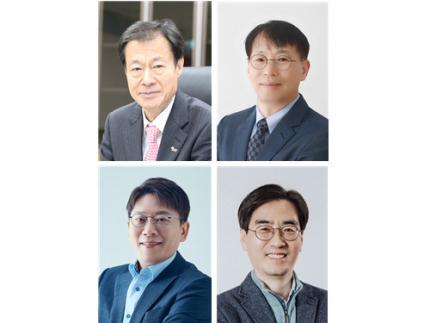 KAIST Alumni Association to Honor Alumni of the Year Award Winners
Photo 1. Photo of the KAIST Alumni of the Year Award Recipients
(From left) UST President Lee-whan Kim, CEO Han Chung of iThree Systems Co., Ltd., CEO Dong Myung Kim of LG Energy Solution Co., Ltd., and Professor Hyun Myung of the School of Electrical Engineering at KAIST
KAIST (President Kwang Hyung Lee) announced on Monday, the 13th of January that the Alumni Association (President Yun-Tae Lee) has selected its Alumni of the Year.
This year’s honorees are: ▴ President Lee-whan Kim of the Korea National University of Science and Technology (UST), ▴ CEO Han Chung of i3 Systems, ▴ CEO Dong Myung Kim of LG Energy Solution, and ▴ Professor Hyun Myung of the School of Electrical Engineering at KAIST.
The honorees were selected based on their achievements over the past year, and the award ceremony will be held at the 2025 KAIST Alumni Association New Year’s Gathering to be held at the L Tower in Seoul at 5 PM on Friday the 17th.
The KAIST Alumni of the Year Award is an award presented by the Alumni Association to alumni who have contributed to the development of the country and the society or have brought honor to their alma mater through outstanding academic achievements and community service. Since its establishment in 1992, 126 recipients have been awarded.
Lee-whan Kim (Master's graduate of Mechanical Engineering, 82), the President of the Korea National University of Science and Technology (UST), established a leading foundation for national science and technology policy and strategy, and played a leading role in innovating national science and technology capabilities through the advancement of the national research and development system and the advancement of science and technology personnel training. In particular, he played a pivotal role in the establishment of UST and the Korea Science Academy (KSA), and greatly contributed to establishing a foundation for the training and utilization of science and technology personnel.
Han Chung (Master's graduate of Electrical Engineering, 91, with Ph.D. degree in 96), the CEO of i3 Systems, is a first-generation researcher in the field of domestic infrared detectors. He developed military detectors for over 30 years and founded i3 Systems, a specialized infrared detector company, in 1998. Currently, he supplies more than 80% of the infrared detectors used by the Korean military, and has also achieved export results to over 20 countries.
Dong Myung Kim (Master's graduate of Materials Science and Engineering, 94, with Ph.D. degree in 98) the CEO of LG Energy Solution Co., Ltd. has led innovation in the battery field with his ceaseless exploration and challenging spirit, and is known as an authority in the secondary battery industry. He played a leading role in establishing K-Battery as a global leader, strengthened the country's future industrial competitiveness, and greatly contributed to the development of science and technology.
Hyun Myung (Bachelor's graduate of Electrical Engineering, 92, with Master's degree in 94, and Ph.D. degree in 98) a Professor of Electrical Engineering, KAIST, won first place in the world at the Quadruped Robot Challenge (QRC) hosted by the IEEE’s International Conference on Robotics and Automation (ICRA) 2023 with the 'DreamWaQ' system, an AI walking technology based on deep reinforcement learning that utilizes non-video sensory technologies. He contributed to enhancing the competitiveness of the domestic robot industry by developing his own fully autonomous walking technology that recognizes the environment around the robot and finds the optimal path.
Yun-Tae Lee, the 27th president of the KAIST Alumni Association, said, “KAIST alumni have been the driving force behind the growth of industries in all walks of life by continuously conducting research and development in the field of advanced science and technology for a long time,” and added, “I am very proud of the KAIST alumni award recipients who are leading science and technology on the world stage beyond Korea, and I sincerely thank them for their efforts and achievements.”
2025.01.15 View 5342
KAIST Alumni Association to Honor Alumni of the Year Award Winners
Photo 1. Photo of the KAIST Alumni of the Year Award Recipients
(From left) UST President Lee-whan Kim, CEO Han Chung of iThree Systems Co., Ltd., CEO Dong Myung Kim of LG Energy Solution Co., Ltd., and Professor Hyun Myung of the School of Electrical Engineering at KAIST
KAIST (President Kwang Hyung Lee) announced on Monday, the 13th of January that the Alumni Association (President Yun-Tae Lee) has selected its Alumni of the Year.
This year’s honorees are: ▴ President Lee-whan Kim of the Korea National University of Science and Technology (UST), ▴ CEO Han Chung of i3 Systems, ▴ CEO Dong Myung Kim of LG Energy Solution, and ▴ Professor Hyun Myung of the School of Electrical Engineering at KAIST.
The honorees were selected based on their achievements over the past year, and the award ceremony will be held at the 2025 KAIST Alumni Association New Year’s Gathering to be held at the L Tower in Seoul at 5 PM on Friday the 17th.
The KAIST Alumni of the Year Award is an award presented by the Alumni Association to alumni who have contributed to the development of the country and the society or have brought honor to their alma mater through outstanding academic achievements and community service. Since its establishment in 1992, 126 recipients have been awarded.
Lee-whan Kim (Master's graduate of Mechanical Engineering, 82), the President of the Korea National University of Science and Technology (UST), established a leading foundation for national science and technology policy and strategy, and played a leading role in innovating national science and technology capabilities through the advancement of the national research and development system and the advancement of science and technology personnel training. In particular, he played a pivotal role in the establishment of UST and the Korea Science Academy (KSA), and greatly contributed to establishing a foundation for the training and utilization of science and technology personnel.
Han Chung (Master's graduate of Electrical Engineering, 91, with Ph.D. degree in 96), the CEO of i3 Systems, is a first-generation researcher in the field of domestic infrared detectors. He developed military detectors for over 30 years and founded i3 Systems, a specialized infrared detector company, in 1998. Currently, he supplies more than 80% of the infrared detectors used by the Korean military, and has also achieved export results to over 20 countries.
Dong Myung Kim (Master's graduate of Materials Science and Engineering, 94, with Ph.D. degree in 98) the CEO of LG Energy Solution Co., Ltd. has led innovation in the battery field with his ceaseless exploration and challenging spirit, and is known as an authority in the secondary battery industry. He played a leading role in establishing K-Battery as a global leader, strengthened the country's future industrial competitiveness, and greatly contributed to the development of science and technology.
Hyun Myung (Bachelor's graduate of Electrical Engineering, 92, with Master's degree in 94, and Ph.D. degree in 98) a Professor of Electrical Engineering, KAIST, won first place in the world at the Quadruped Robot Challenge (QRC) hosted by the IEEE’s International Conference on Robotics and Automation (ICRA) 2023 with the 'DreamWaQ' system, an AI walking technology based on deep reinforcement learning that utilizes non-video sensory technologies. He contributed to enhancing the competitiveness of the domestic robot industry by developing his own fully autonomous walking technology that recognizes the environment around the robot and finds the optimal path.
Yun-Tae Lee, the 27th president of the KAIST Alumni Association, said, “KAIST alumni have been the driving force behind the growth of industries in all walks of life by continuously conducting research and development in the field of advanced science and technology for a long time,” and added, “I am very proud of the KAIST alumni award recipients who are leading science and technology on the world stage beyond Korea, and I sincerely thank them for their efforts and achievements.”
2025.01.15 View 5342 -
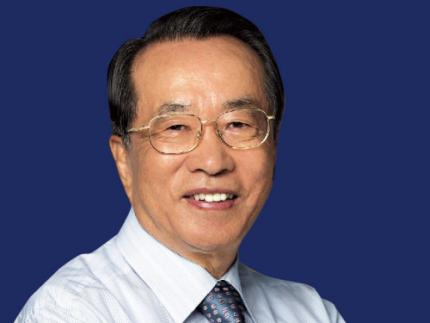 Dongwon Group Honorary Chairman Kim Jae-chul Donates a Total of 54.4 Billion Won to KAIST
- Dongwon Group Honorary Chairman Kim Jae-chul, following his 2020 donation of 50 billion won, donates an additional 4.4 billion won to strengthen the AI education and research infrastructure
- The additional donation of 4.4 billion won will be used to build a new AI education and research building
- “In the AI era, there will be a new future in the sea of data. Please become the world’s No. 1 research group.” - Honorary Chairman Kim Jae-chul
< Photo 1. Kim Jae-chul, Honorary Chairman of Dongwon Group >
KAIST (President Kwang Hyung Lee) announced on the 6th of January that Dongwon Group's Honorary Chairman Kim Jae-chul has pledged an additional development fund of 4.4 billion won to strengthen the AI education and research infrastructure. This is his second donation following the 50 billion won donated in 2020.
In 2020, Chairman Kim expressed his hope that KAIST acquire the highest level of capabilities in the field of AI by establishing the "Kim Jaechul Graduate School of AI" with his donation. Upon hearing that KAIST's AI research level was ranked fifth in the world, Chairman Kim asked that it be raised to first.
In response to Chairman Kim's request, President Kwang Hyung Lee explained, "The number of AI professors at Carnegie Mellon University (CMU), currently ranked first in the world, is 45. To surpass this, the KAIST AI Graduate School's faculty should be expanded from its current level of 20 to 50, and a research building should be built so that they can focus on research." Chairman Kim responded, "I'll build that building for you, so don’t worry about that."
KAIST will use 48.3 billion won of the donated funds to build an education and research building with a total floor area of 18,182㎡ (5,500 pyeong) on eight floors above ground and one floor below ground. The new building, which is scheduled to be completed in February 2028, is expected to be a world-class educational research facility that can house 50 professors and 1,000 students.
Chairman Kim said, “When I was young, I looked for the future of Korea in the blue ocean of the world, but in the AI era, a new future will be in the ocean of data,” and explained the purpose of the donation, saying, “I hope that Korea will be able to lead the era of the 4th industrial revolution by fostering global core talents who can leap forward as leaders in the era of data exploration.”
President Kwang Hyung Lee said, “I respect Chairman Kim’s decision to open a new horizon for fostering next-generation scientific talents who will lead the world. KAIST will grow the Kim Jaechul Graduate School of AI into the world’s No. 1 AI research group, just as Chairman Kim wishes.”
Meanwhile, with this donation, President Kwang Hyung Lee has raised 261.2 billion won in donations during his tenure (1,400 days), raising an average of 186 million won per day.
2025.01.06 View 3361
Dongwon Group Honorary Chairman Kim Jae-chul Donates a Total of 54.4 Billion Won to KAIST
- Dongwon Group Honorary Chairman Kim Jae-chul, following his 2020 donation of 50 billion won, donates an additional 4.4 billion won to strengthen the AI education and research infrastructure
- The additional donation of 4.4 billion won will be used to build a new AI education and research building
- “In the AI era, there will be a new future in the sea of data. Please become the world’s No. 1 research group.” - Honorary Chairman Kim Jae-chul
< Photo 1. Kim Jae-chul, Honorary Chairman of Dongwon Group >
KAIST (President Kwang Hyung Lee) announced on the 6th of January that Dongwon Group's Honorary Chairman Kim Jae-chul has pledged an additional development fund of 4.4 billion won to strengthen the AI education and research infrastructure. This is his second donation following the 50 billion won donated in 2020.
In 2020, Chairman Kim expressed his hope that KAIST acquire the highest level of capabilities in the field of AI by establishing the "Kim Jaechul Graduate School of AI" with his donation. Upon hearing that KAIST's AI research level was ranked fifth in the world, Chairman Kim asked that it be raised to first.
In response to Chairman Kim's request, President Kwang Hyung Lee explained, "The number of AI professors at Carnegie Mellon University (CMU), currently ranked first in the world, is 45. To surpass this, the KAIST AI Graduate School's faculty should be expanded from its current level of 20 to 50, and a research building should be built so that they can focus on research." Chairman Kim responded, "I'll build that building for you, so don’t worry about that."
KAIST will use 48.3 billion won of the donated funds to build an education and research building with a total floor area of 18,182㎡ (5,500 pyeong) on eight floors above ground and one floor below ground. The new building, which is scheduled to be completed in February 2028, is expected to be a world-class educational research facility that can house 50 professors and 1,000 students.
Chairman Kim said, “When I was young, I looked for the future of Korea in the blue ocean of the world, but in the AI era, a new future will be in the ocean of data,” and explained the purpose of the donation, saying, “I hope that Korea will be able to lead the era of the 4th industrial revolution by fostering global core talents who can leap forward as leaders in the era of data exploration.”
President Kwang Hyung Lee said, “I respect Chairman Kim’s decision to open a new horizon for fostering next-generation scientific talents who will lead the world. KAIST will grow the Kim Jaechul Graduate School of AI into the world’s No. 1 AI research group, just as Chairman Kim wishes.”
Meanwhile, with this donation, President Kwang Hyung Lee has raised 261.2 billion won in donations during his tenure (1,400 days), raising an average of 186 million won per day.
2025.01.06 View 3361 -
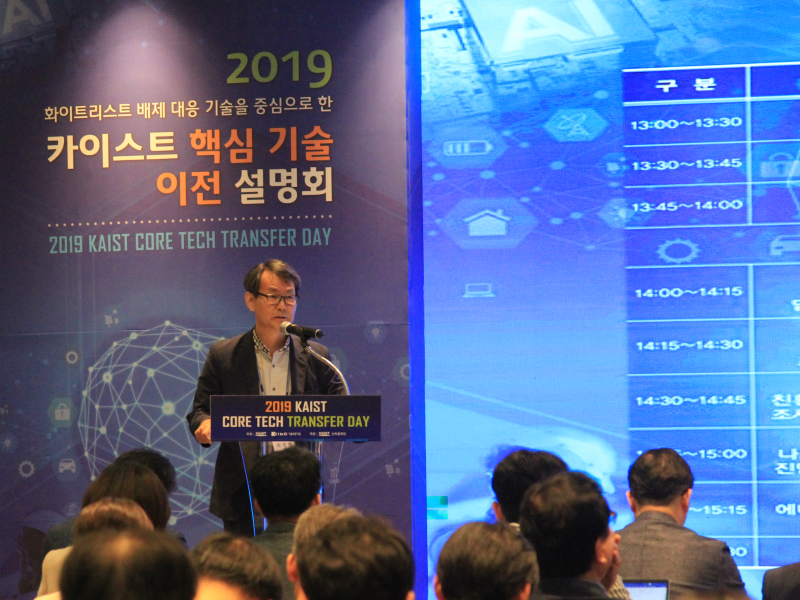 KAIST to Transfer Core Tech to Domestic Companies amid Japan's Export Curbs
< Associate Vice President Kyung-Cheol Choi of the Office of University-Industry Cooperation (OUIC) at KAIST >
KAIST will transfer four core technologies related to materials, parts, and equipment to domestic companies to help them combat the latest export curbs triggered by Korea’s removal from Japan’s ‘white list’ of preferential trade partners. In addition, KAIST’s five patented technologies in the field of artificial intelligence (AI) and materials and parts will also be transferred to the companies in order to reduce the reliance on Japan and achieve technological independence through the ‘localization’ of key technologies.
KAIST announced these university-industry cooperation promotion plans at the ‘2019 KAIST Core Tech Transfer Day Conference’ held in Seoul on September 17. More than 200 entrepreneurs and investors attended the briefing and on-site consulting sessions delivered by nine KAIST professors who led the development of the technologies.
The four technologies were presented at the conference as those that can replace Japanese technologies subject to the export curbs. They include:
1. ‘Transparent fluorinated polyimide with low thermal expansion’ developed by Professor Sang-Youl Kim of the Department of Chemistry
2. ‘A non-destructive electromagnetic performance testing system’ developed by Professor Jung-Ryul Lee of the Department of Aerospace Engineering
3. ‘A nanotechnology-based electrode material for use in advanced secondary batteries’ developed by Professor Do-Kyung Kim of the Department of Materials Science and Engineering
4. ‘A high-resolution photoresist’ developed by Professor Emeritus Jin-Baek Kim of the Department of Chemistry.
Of particular interest is the non-destructive electromagnetic performance testing system technology developed by Professor Jung-Ryul Lee. This new cost-effective technology enables tests that were impossible to carry out using conventional technologies and yields a cost reduction of more than 50 percent compared to foreign technologies.
By introducing Professor Do-Kyung Kim’s new electrode material technology, the efficiency of electric vehicles can be increased. As this technology uses relatively low-cost sodium ion batteries, industries can prepare for the possible jump from the more expensive lithium batteries currently being used.
Another five patented AI and materials and parts technologies disclosed at the conference include:
1. ‘Enhanced HTTP adaptive streaming with CNN-based super-resolution’ developed by Professor Dong-soo Han of the School of Electrical Engineering
2. ‘Method and apparatus of brain-computer interface design for estimating choice behavior and decision strategy’ developed by Professor Sang-Wan Lee of the Department of Bio and Brain Engineering
3. ‘Eco-friendly fabrication of metal oxide nanoparticles and fabrication of non-toxic polymer sunscreen ingredients by electron irradiation’ developed by Professor Sung-Oh Cho of the Department of Nuclear and Quantum Engineering
4. ‘High-density nanofiber yarn-based coloricmetric gas sensors’ developed by Professor Il-Doo Kim of the Department of Materials Science and Engineering
5. ‘Silicon-pocket energy storage electrode with high energy density and its manufacturing technology’ developed by Professor Jeung-Ku Kang of the Graduate school of EEWS.
The patented nanofiber-based coloricmetric gas sensor technology developed by Professor Il-Doo Kim allows for the diagnosis of diseases by only using the patient’s respiration. Due to its high productivity and processability, it is expected to be applied to various fields in the fast-growing disease diagnosis sensor market, which includes mobile devices and wearable sensors.
Moreover, Professor Dong-soo Han’s patented adaptive streaming technology attracted attention along with the ever-growing Over The Top (OTT) and Video On Demand (VOD) service markets, since it has significant potential for improving the streaming quality of videos and reducing costs for video providers.
Professor Kyung-Cheol Choi, the Associate Vice President of the Office of University-Industry Cooperation (OUIC) at KAIST, said, “KAIST OUIC and KAIST Advisors on Materials and Parts (KAMP) have been working tirelessly to help Korean companies cope with the recent Japanese export restrictions. KAIST’s efforts will enhance the competitiveness and growth of the Korean industry and economy, turning this national crisis into opportunity.”
(END)
2019.09.20 View 7881
KAIST to Transfer Core Tech to Domestic Companies amid Japan's Export Curbs
< Associate Vice President Kyung-Cheol Choi of the Office of University-Industry Cooperation (OUIC) at KAIST >
KAIST will transfer four core technologies related to materials, parts, and equipment to domestic companies to help them combat the latest export curbs triggered by Korea’s removal from Japan’s ‘white list’ of preferential trade partners. In addition, KAIST’s five patented technologies in the field of artificial intelligence (AI) and materials and parts will also be transferred to the companies in order to reduce the reliance on Japan and achieve technological independence through the ‘localization’ of key technologies.
KAIST announced these university-industry cooperation promotion plans at the ‘2019 KAIST Core Tech Transfer Day Conference’ held in Seoul on September 17. More than 200 entrepreneurs and investors attended the briefing and on-site consulting sessions delivered by nine KAIST professors who led the development of the technologies.
The four technologies were presented at the conference as those that can replace Japanese technologies subject to the export curbs. They include:
1. ‘Transparent fluorinated polyimide with low thermal expansion’ developed by Professor Sang-Youl Kim of the Department of Chemistry
2. ‘A non-destructive electromagnetic performance testing system’ developed by Professor Jung-Ryul Lee of the Department of Aerospace Engineering
3. ‘A nanotechnology-based electrode material for use in advanced secondary batteries’ developed by Professor Do-Kyung Kim of the Department of Materials Science and Engineering
4. ‘A high-resolution photoresist’ developed by Professor Emeritus Jin-Baek Kim of the Department of Chemistry.
Of particular interest is the non-destructive electromagnetic performance testing system technology developed by Professor Jung-Ryul Lee. This new cost-effective technology enables tests that were impossible to carry out using conventional technologies and yields a cost reduction of more than 50 percent compared to foreign technologies.
By introducing Professor Do-Kyung Kim’s new electrode material technology, the efficiency of electric vehicles can be increased. As this technology uses relatively low-cost sodium ion batteries, industries can prepare for the possible jump from the more expensive lithium batteries currently being used.
Another five patented AI and materials and parts technologies disclosed at the conference include:
1. ‘Enhanced HTTP adaptive streaming with CNN-based super-resolution’ developed by Professor Dong-soo Han of the School of Electrical Engineering
2. ‘Method and apparatus of brain-computer interface design for estimating choice behavior and decision strategy’ developed by Professor Sang-Wan Lee of the Department of Bio and Brain Engineering
3. ‘Eco-friendly fabrication of metal oxide nanoparticles and fabrication of non-toxic polymer sunscreen ingredients by electron irradiation’ developed by Professor Sung-Oh Cho of the Department of Nuclear and Quantum Engineering
4. ‘High-density nanofiber yarn-based coloricmetric gas sensors’ developed by Professor Il-Doo Kim of the Department of Materials Science and Engineering
5. ‘Silicon-pocket energy storage electrode with high energy density and its manufacturing technology’ developed by Professor Jeung-Ku Kang of the Graduate school of EEWS.
The patented nanofiber-based coloricmetric gas sensor technology developed by Professor Il-Doo Kim allows for the diagnosis of diseases by only using the patient’s respiration. Due to its high productivity and processability, it is expected to be applied to various fields in the fast-growing disease diagnosis sensor market, which includes mobile devices and wearable sensors.
Moreover, Professor Dong-soo Han’s patented adaptive streaming technology attracted attention along with the ever-growing Over The Top (OTT) and Video On Demand (VOD) service markets, since it has significant potential for improving the streaming quality of videos and reducing costs for video providers.
Professor Kyung-Cheol Choi, the Associate Vice President of the Office of University-Industry Cooperation (OUIC) at KAIST, said, “KAIST OUIC and KAIST Advisors on Materials and Parts (KAMP) have been working tirelessly to help Korean companies cope with the recent Japanese export restrictions. KAIST’s efforts will enhance the competitiveness and growth of the Korean industry and economy, turning this national crisis into opportunity.”
(END)
2019.09.20 View 7881 -
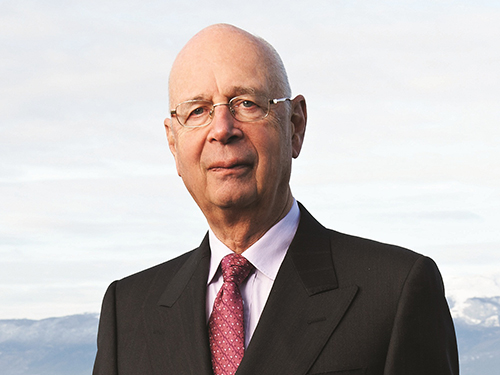 Klaus Schwab to Receive Doctorate from KAIST University
Courtesy of Press Release from the World Economic Forum:
Klaus Schwab to Receive Doctorate from KAIST University
KAIST University to confer Doctorate to World Economic Forum Executive Chairman and Founder Klaus Schwab
The ceremony will take place on 7 September at KAIST University, Daejeon, South Korea
For more information: http://wef.ch/KlausSchwab
Geneva, Switzerland, 26 August 2015 – Professor Klaus Schwab, Founder and Executive Chairman of the World Economic Forum, will be honoured on Monday 7 September by the Korea Advanced Institute of Science and Technology (KAIST), with his 14th honorary doctorate.
This honour will be bestowed on him in recognition of his work in the field of science, in particular his efforts to promote corporate social responsibility and for the concept of multistakeholder cooperation, which he originated in 1971.
Before creating the World Economic Forum, Professor Schwab had a distinctive academic career, earning two doctorates – one in engineering from the Swiss Federal Institute of Technology (ETH) in Zurich and the other in economics (summa cum laude) from the University of Fribourg, Switzerland. He also studied at Harvard University, where he earned a Master in Public Administration. In 1972 he became one of the youngest professors at the University of Geneva, where he taught business policy for over 30 years.
The ceremony will be attended by over 200 students, KAIST faculty members, Jang-Moo Lee, Chairman of the KAIST Board of Trustees, and Mayor Seon-Taek Kwon of Daejeon. “Klaus Schwab, through his forward-looking vision and outstanding leadership, has cultivated the World Economic Forum into a global organization, contributing significantly to improving the global economy as well as to resolving international conflicts,” said Sung-Mo “Steve” Kang, President of KAIST.
“It is a great honour to receive this honorary doctoral degree from KAIST, an institution which is known for academic excellence and the role it has played in helping South Korea achieve the level of modernization in a matter of decades that the western world took over a century to achieve,” Professor Schwab said.
At the ceremony, Professor Schwab will give a speech on the “Impact of Disruptive Forces on Our World” and will elaborate on how technological and geopolitical development is shaping global, regional, national and industry agendas.
2015.09.09 View 8878
Klaus Schwab to Receive Doctorate from KAIST University
Courtesy of Press Release from the World Economic Forum:
Klaus Schwab to Receive Doctorate from KAIST University
KAIST University to confer Doctorate to World Economic Forum Executive Chairman and Founder Klaus Schwab
The ceremony will take place on 7 September at KAIST University, Daejeon, South Korea
For more information: http://wef.ch/KlausSchwab
Geneva, Switzerland, 26 August 2015 – Professor Klaus Schwab, Founder and Executive Chairman of the World Economic Forum, will be honoured on Monday 7 September by the Korea Advanced Institute of Science and Technology (KAIST), with his 14th honorary doctorate.
This honour will be bestowed on him in recognition of his work in the field of science, in particular his efforts to promote corporate social responsibility and for the concept of multistakeholder cooperation, which he originated in 1971.
Before creating the World Economic Forum, Professor Schwab had a distinctive academic career, earning two doctorates – one in engineering from the Swiss Federal Institute of Technology (ETH) in Zurich and the other in economics (summa cum laude) from the University of Fribourg, Switzerland. He also studied at Harvard University, where he earned a Master in Public Administration. In 1972 he became one of the youngest professors at the University of Geneva, where he taught business policy for over 30 years.
The ceremony will be attended by over 200 students, KAIST faculty members, Jang-Moo Lee, Chairman of the KAIST Board of Trustees, and Mayor Seon-Taek Kwon of Daejeon. “Klaus Schwab, through his forward-looking vision and outstanding leadership, has cultivated the World Economic Forum into a global organization, contributing significantly to improving the global economy as well as to resolving international conflicts,” said Sung-Mo “Steve” Kang, President of KAIST.
“It is a great honour to receive this honorary doctoral degree from KAIST, an institution which is known for academic excellence and the role it has played in helping South Korea achieve the level of modernization in a matter of decades that the western world took over a century to achieve,” Professor Schwab said.
At the ceremony, Professor Schwab will give a speech on the “Impact of Disruptive Forces on Our World” and will elaborate on how technological and geopolitical development is shaping global, regional, national and industry agendas.
2015.09.09 View 8878 -
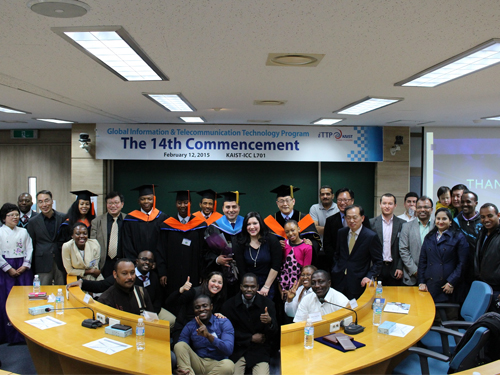 ITTP Produces 119 Graduates from 52 Countries.
“Transparency of Costa Rica was highly improved after adopting an electronic purchase and supply system from Korea.”
So noted a public official from the technical office of the digital government in Costa Rica, Ileana Palaco, who entered the master’s program in KAIST’s Global Information and Telecommunication Technology Program (ITTP) last September.
She also said, “The electronic government of Korea is an exemplary model emulated in the establishment of the e-Government system in Central and South America. I am eager to introduce Korean IT technology and policies to the countries in the region.”
Consisting of master’s and doctoral programs designed for public officials and technical experts in emerging countries, ITTP fosters international cooperation, builds human networks, and supports domestic companies in technology transfers.
For the past twenty years, the IT industry has been the key to Korea’s development. Utilizing its advancement in the IT technology, Korea provides developing countries with the support necessary for their continuous growth in the 21st century. To that end, KAIST created ITTP which invites government officials from emerging countries with a growing IT industry.
Run by the Business and Technology Management Department of KAIST since 2006, ITTP has produced 119 graduates from 52 countries. For the past 10 years, 57 students from Africa, 45 from South East-Asia, 16 from Eastern Europe, and 7 from the Middle East were accepted to the program.
The program consists of theory-based classes which introduces the technology and IT policies of Korea and project-based classes for university-industry cooperation. In the latter, experts from professional organizations in IT such as the Electronics and Telecommunications Research Institute (ETRI), the National Information Society Agency (NIA), and Korea Telecom participate and provide information based on industry experience.
Foreign governments and international organizations have reacted positively to this program. Having recognized its excellence, the International Telecommunication Union (ITU) has supported it by sending the application information to 193 member countries. The African Development Bank (AFDB) chose ITTP as one of the Next Generation African Leadership Programs and assigned 19 public officials from Africa.
ITTP graduates have played a large role in promoting the e-Government system overseas. In In 25 cases in 2012, graduates participated as researchers in 6 cases. Thanks to the support of elite public officials from emerging countries who graduated from ITTP, Korean technology companies can bring their technology to overseas countries more effectively.
Recently, government officials from these countries have been asking for both long and short- term programs on technology and IT policies. In response, KAIST is planning to expand the program. Professor Jaejeung Rho from the Business and Technology Management Department who supervises this program said, “Allowing public officials in the field of IT all over the world to know more about Korea is very important in raising Korea’s reputation in technology and in the globe” and added that “having these officials is a boon in keeping our country’s competitive edge in the IT industry.”
Picture: About 60 people including ITTP students, the Nigerian ambassador to Korea, and President Steve Kang of KAIST joined a ceremony to raise a scholarship fund for KAIST on April 2, 2015 at Munji campus in Daejeon.
2015.04.03 View 8458
ITTP Produces 119 Graduates from 52 Countries.
“Transparency of Costa Rica was highly improved after adopting an electronic purchase and supply system from Korea.”
So noted a public official from the technical office of the digital government in Costa Rica, Ileana Palaco, who entered the master’s program in KAIST’s Global Information and Telecommunication Technology Program (ITTP) last September.
She also said, “The electronic government of Korea is an exemplary model emulated in the establishment of the e-Government system in Central and South America. I am eager to introduce Korean IT technology and policies to the countries in the region.”
Consisting of master’s and doctoral programs designed for public officials and technical experts in emerging countries, ITTP fosters international cooperation, builds human networks, and supports domestic companies in technology transfers.
For the past twenty years, the IT industry has been the key to Korea’s development. Utilizing its advancement in the IT technology, Korea provides developing countries with the support necessary for their continuous growth in the 21st century. To that end, KAIST created ITTP which invites government officials from emerging countries with a growing IT industry.
Run by the Business and Technology Management Department of KAIST since 2006, ITTP has produced 119 graduates from 52 countries. For the past 10 years, 57 students from Africa, 45 from South East-Asia, 16 from Eastern Europe, and 7 from the Middle East were accepted to the program.
The program consists of theory-based classes which introduces the technology and IT policies of Korea and project-based classes for university-industry cooperation. In the latter, experts from professional organizations in IT such as the Electronics and Telecommunications Research Institute (ETRI), the National Information Society Agency (NIA), and Korea Telecom participate and provide information based on industry experience.
Foreign governments and international organizations have reacted positively to this program. Having recognized its excellence, the International Telecommunication Union (ITU) has supported it by sending the application information to 193 member countries. The African Development Bank (AFDB) chose ITTP as one of the Next Generation African Leadership Programs and assigned 19 public officials from Africa.
ITTP graduates have played a large role in promoting the e-Government system overseas. In In 25 cases in 2012, graduates participated as researchers in 6 cases. Thanks to the support of elite public officials from emerging countries who graduated from ITTP, Korean technology companies can bring their technology to overseas countries more effectively.
Recently, government officials from these countries have been asking for both long and short- term programs on technology and IT policies. In response, KAIST is planning to expand the program. Professor Jaejeung Rho from the Business and Technology Management Department who supervises this program said, “Allowing public officials in the field of IT all over the world to know more about Korea is very important in raising Korea’s reputation in technology and in the globe” and added that “having these officials is a boon in keeping our country’s competitive edge in the IT industry.”
Picture: About 60 people including ITTP students, the Nigerian ambassador to Korea, and President Steve Kang of KAIST joined a ceremony to raise a scholarship fund for KAIST on April 2, 2015 at Munji campus in Daejeon.
2015.04.03 View 8458 -
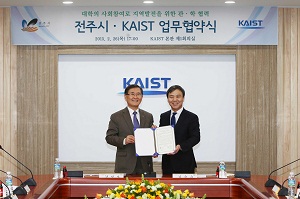 KAIST Signs MOU with Jeonju City
KAIST signed a memorandum of understanding for the development of new industries based on convergence technology with the government of Jeonju City on February 26, 2015. Located in the south west portion of the Korean peninsula, Jeonju City is home to a rich historical and cultural heritage.
Taking advantage of its proximity to the university's campus, the city will cooperate with KAIST to develop the local economy through creating new industries and jobs. To that end, KAIST and Jeonju will foster carbon-based industry, 3D printing technology, the Internet of Things, and emerging technologies. The two organizations also hope this cooperation will produce highly educated manpower for research and development in the city and offer the city to conduct national research projects.
President Sung-Mo Kang and Mayor Seung-Soo Kim pose after signing in the picture below.
2015.02.26 View 8568
KAIST Signs MOU with Jeonju City
KAIST signed a memorandum of understanding for the development of new industries based on convergence technology with the government of Jeonju City on February 26, 2015. Located in the south west portion of the Korean peninsula, Jeonju City is home to a rich historical and cultural heritage.
Taking advantage of its proximity to the university's campus, the city will cooperate with KAIST to develop the local economy through creating new industries and jobs. To that end, KAIST and Jeonju will foster carbon-based industry, 3D printing technology, the Internet of Things, and emerging technologies. The two organizations also hope this cooperation will produce highly educated manpower for research and development in the city and offer the city to conduct national research projects.
President Sung-Mo Kang and Mayor Seung-Soo Kim pose after signing in the picture below.
2015.02.26 View 8568 -
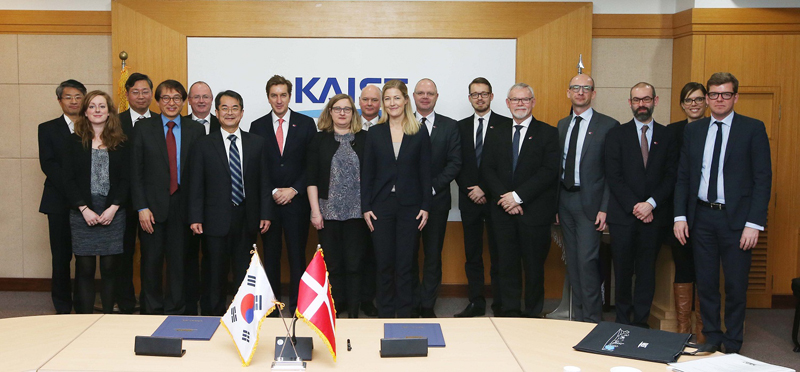 Danish Minister for Higher Education and Science Visits KAIST
Sofie Carsten Nielsen, the Minister for Higher Education and Science of Denmark, accompanied by her delegation, visited KAIST on January 21, 2015 to study outstanding cases of creative economy and to discuss methods of cooperation.
Her delegation included other distinguished members including Thomas Lehmann, the Danish ambassador to Korea, Peter Olesen, Chairman of Innovation Foundation Denmark Governing Board, and Martin Bendsøe, Senior Vice President and Dean of Technical University of Denmark.
After attending the "Electronic Communication Double Degree Agreement" signing ceremony between KAIST’s Department of Electrical Engineering and the Technical University of Denmark, Minister Nielsen visited KAIST’s Institute of Entrepreneurship to observe bilateral industry-university collaborations between KAIST and Denmark and discussed future development plans.
Also, the Grundfos Student Innovation Camp, sponsored by Grundfos, the world's largest pump manufacturer based in Denmark, took place at KAIST from October 26-31, 2014 where Grundfos professionals as well as students from Seoul National University, KAIST, and Technical University of Denmark (DTU) exchanged ideas and opinions on energy efficiency.
KAIST is currently conducting 19 collaborative projects including seven joint researches and seven joint degrees with DTU.
Minister Sofie Carsten Nielsen stands fifth from the left in the front row in the first picture below.
2015.01.27 View 10572
Danish Minister for Higher Education and Science Visits KAIST
Sofie Carsten Nielsen, the Minister for Higher Education and Science of Denmark, accompanied by her delegation, visited KAIST on January 21, 2015 to study outstanding cases of creative economy and to discuss methods of cooperation.
Her delegation included other distinguished members including Thomas Lehmann, the Danish ambassador to Korea, Peter Olesen, Chairman of Innovation Foundation Denmark Governing Board, and Martin Bendsøe, Senior Vice President and Dean of Technical University of Denmark.
After attending the "Electronic Communication Double Degree Agreement" signing ceremony between KAIST’s Department of Electrical Engineering and the Technical University of Denmark, Minister Nielsen visited KAIST’s Institute of Entrepreneurship to observe bilateral industry-university collaborations between KAIST and Denmark and discussed future development plans.
Also, the Grundfos Student Innovation Camp, sponsored by Grundfos, the world's largest pump manufacturer based in Denmark, took place at KAIST from October 26-31, 2014 where Grundfos professionals as well as students from Seoul National University, KAIST, and Technical University of Denmark (DTU) exchanged ideas and opinions on energy efficiency.
KAIST is currently conducting 19 collaborative projects including seven joint researches and seven joint degrees with DTU.
Minister Sofie Carsten Nielsen stands fifth from the left in the front row in the first picture below.
2015.01.27 View 10572 -
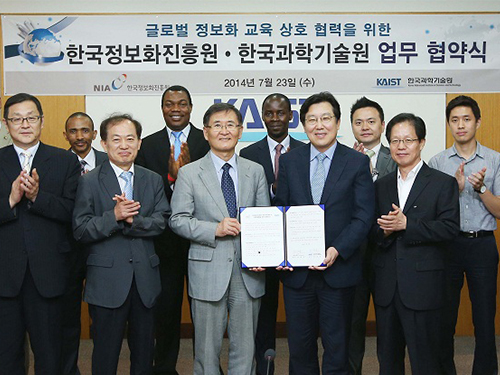 Cooperation Agreement with Korea's National Information Society Agency on Global Information Education
KAIST and the National Information Society Agency (NIA) signed a memorandum of understanding (MOU) to launch global information education cooperation. President Steve Kang and President Kwang-Soo Chang of NIA, attended the signing ceremony held at KAIST on July 23, 2014.
Under the MOU, KAIST and NIA will jointly develop contents for global information education; plan and operate educational programs; provide consulting services to train experts in information; and implement exchange programs for faculty and students.
In addition, the two organizations plan to cooperate in the establishment of a network, consisting of alumni and students from the Global Information and Telecommunications Technology Program at KAIST (KAIST ITTP), to deliver a Korean model of electronic government (e-government) to other nations worldwide.
President Kang said, “Korea is one of the most wired nations in the world. By working with the NIA, we hope to have an opportunity to export our knowledge and experiences in the construction of e-governments to less technologically advanced nations by becoming a good precedent for them.”
Since 2006, KAIST has invited 20-30 government officials from underdeveloped or developing countries each year, offering them enrollment in graduate programs at KAIST ITTP.
2014.07.25 View 8236
Cooperation Agreement with Korea's National Information Society Agency on Global Information Education
KAIST and the National Information Society Agency (NIA) signed a memorandum of understanding (MOU) to launch global information education cooperation. President Steve Kang and President Kwang-Soo Chang of NIA, attended the signing ceremony held at KAIST on July 23, 2014.
Under the MOU, KAIST and NIA will jointly develop contents for global information education; plan and operate educational programs; provide consulting services to train experts in information; and implement exchange programs for faculty and students.
In addition, the two organizations plan to cooperate in the establishment of a network, consisting of alumni and students from the Global Information and Telecommunications Technology Program at KAIST (KAIST ITTP), to deliver a Korean model of electronic government (e-government) to other nations worldwide.
President Kang said, “Korea is one of the most wired nations in the world. By working with the NIA, we hope to have an opportunity to export our knowledge and experiences in the construction of e-governments to less technologically advanced nations by becoming a good precedent for them.”
Since 2006, KAIST has invited 20-30 government officials from underdeveloped or developing countries each year, offering them enrollment in graduate programs at KAIST ITTP.
2014.07.25 View 8236